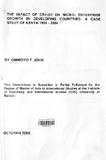| dc.contributor.author | Omwoyo,John F | |
| dc.date.accessioned | 2013-04-29T13:08:33Z | |
| dc.date.available | 2013-04-29T13:08:33Z | |
| dc.date.issued | 2006 | |
| dc.identifier.citation | This Dissertation is Submitted in Partial Fulfilment for the Degreeof Master of Arts In International Studies at the Institute of Diplomacy and International Studies (lOIS), University of Nairobi. | en |
| dc.identifier.uri | http://erepository.uonbi.ac.ke:8080/xmlui/handle/123456789/17781 | |
| dc.description.abstract | The micro-finance sector has been considered to be of extreme importance for developing countries such as Kenya given its potential on poverty alleviation, employment creation and promoting socio-economic transformation. The core focus of this study was to investigate the impact of credit on micro enterprise growth in developing countries with reference to Kenya for the period 1994-2004.
The study sought to examine the impact of credit accessibility on MSE growth in Kenya, investigate the mechanisms the Kenya government has put in place to improve credit accessibility by MSEs and outline policy options that can enhance credit accessibility by MSEs in Kenya.
The study found out that limited credit access by MSEs has been a major constraint in their development in Kenya. The mainstream financial institutions advance credit against property, debentures on stock, and moveable assets as security which majority of MSEs lack. As a result only 6% of MSEs were able to successfully access and use credit. Indeed more than a third of MSEs close down due to inadequate working capital. This implies the potential role of MSEs in poverty reduction and socio-economic transformation is unlikely to be achieved.
The MSEs that access credits successfully survive longer and are able to expand. The stringent collateral requirements need to be reviewed. Access to bank credit in Kenya is largely confined to medium and large scale enterprises
with secure land titles or property. This has forced MSEs to seek credit from informal sources such as friends and relatives whose terms are flexible. In fact from the study the most important source for starting and additional capital is own/family funds. Equally governmental efforts on addressing credit access have not been successful.
The study recommends that in order to facilitate MSEs access to credit; establishment of micro finance banks that cater exclusively for MSEs is necessary, nurturing cooperation between mainstream commercial banks with micro finance institutions, strengthening existing credit institutions such as KIE, and establishment of MSE forum and enactment of MSE - specific laws. | en |
| dc.language.iso | en | en |
| dc.publisher | University of Nairobi, | |
| dc.title | The Impact of Credit on Micro- Enterprise Growth in Developing Countries: a Case Study of Kenya 1994 - 2004 | en |
| dc.type | Thesis | en |
| local.publisher | Institute of Diplomacy and International Studies | en |

